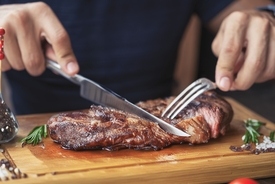There are few things in the world more delicious and satisfying to consume than bacon and booze. There's nothing better that necking back a few pints of cold lager at the end of a long day, and then waking up the next morning and tucking into a yummy bacon roll.
Seriously, if I had to give up either of those things I'd end up feeling very down indeed. However, maybe I should because, if new scientific evidence is to be believed, those tasty rashers and six packs that I've knocked back over the years have actually been almost as bad for me as smoking a pack of cigarettes a day.
The study in question comes courtesy of the World Cancer Research Fund (WCRF) which claims that eating foods like bacon and drinking too much alcohol could increase the risk of cancer by up to an alarming 40 per cent.

An analysis of around 51 million people globally found a correlation between an adult cancer diagnosis and obesity. A total of 12 cancers, including those affecting the liver, ovaries, prostate, stomach, mouth, throat, bowel, breast, gallbladder, kidney, oesophagus, pancreas and womb were linked to high fat intake, as a result of alcoholic beverages and carcinogenic meats such as bacon and cured pork products.
The research has also cautioned that the public should avoid high-starch fast foods, as well as high-sugar, carbonated beverages, and stick to drinking mostly water.
The report's abstract states:
"Avoiding tobacco in any form, together with appropriate diet, nutrition and physical activity, and maintaining a healthy weight, have the potential over time to reduce much of the global burden of cancer. However, with current trends towards decreased physical activity and increased body fatness, the global burden of cancer can be expected to continue to rise until these issues are addressed, especially given projections of an ageing global population. If current trends continue, overweight and obesity are likely to overtake smoking as the number one risk factor for cancer."

Commenting on her findings, Dr Giota Mitrou, WCRF's director of research funding and external relations, stated: "[There is]very strong evidence for a package of lifestyle behaviours as a blueprint for cancer prevention. Our research shows it's unlikely that specific foods or nutrients are important single factors in causing or protecting against cancer. Rather, different patterns of diet and physical activity throughout life combine to make you more or less susceptible to cancer."
Furthermore, the study predicts that new cancer diagnoses are predicted to rise by 58 per cent, to approximately 24 million globally by 2035, which means that we desperately need to find ways of reducing the risks associated with cancer, or find a cure altogether. If you'd like to be a part of that solution, then you might consider making a donation to Cancer Research UK. Your money could make a huge difference.

.jpg_ePaNgJ?tr=h-184&config=JTdCJTIybmFtZSUyMiUzQSUyMkdldHR5SW1hZ2VzLTEyMDc1NTIwNzMlMjAoMSkuanBnJTIyJTJDJTIyYWx0ZXJuYXRpdmVfdGV4dCUyMiUzQSUyMkdldHR5SW1hZ2VzLTEyMDc1NTIwNzMlMjAoMSkuanBnJTIyJTJDJTIyY2FwdGlvbiUyMiUzQSUyMkNyZWRpdCUzQSUyMCUyMCUyMEFubmljayUyMHZhbmRlcnNjaGVsZGVuJTIwcGhvdG9ncmFwaHklMjAlMkYlMjBHZXR0eSUyMiUyQyUyMmNvb3JkaW5hdGVzJTIyJTNBJTdCJTIyZGVza3RvcCUyMiUzQSU3QiUyMmxlZnQlMjIlM0EwJTJDJTIydG9wJTIyJTNBMC4wMiUyQyUyMnJpZ2h0JTIyJTNBMSUyQyUyMmJvdHRvbSUyMiUzQTAuNTUlN0QlMkMlMjJ0YWJsZXQlMjIlM0ElN0IlMjJsZWZ0JTIyJTNBbnVsbCUyQyUyMnRvcCUyMiUzQW51bGwlMkMlMjJyaWdodCUyMiUzQW51bGwlMkMlMjJib3R0b20lMjIlM0FudWxsJTdEJTJDJTIybW9iaWxlJTIyJTNBJTdCJTIybGVmdCUyMiUzQW51bGwlMkMlMjJ0b3AlMjIlM0FudWxsJTJDJTIycmlnaHQlMjIlM0FudWxsJTJDJTIyYm90dG9tJTIyJTNBbnVsbCU3RCU3RCUyQyUyMndpZHRoJTIyJTNBNjcxNCUyQyUyMmhlaWdodCUyMiUzQTM5MDUlN0Q=)

